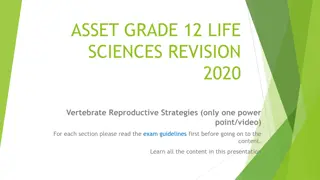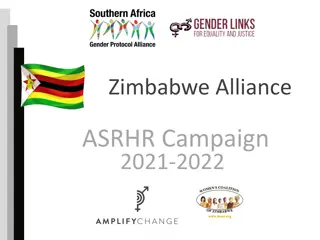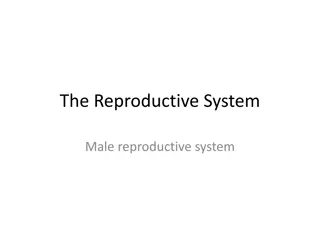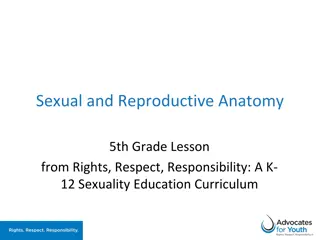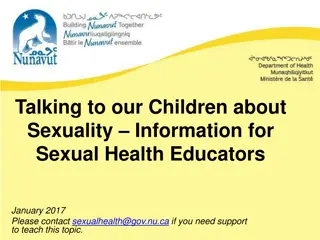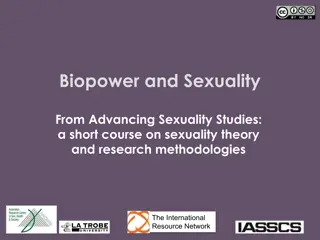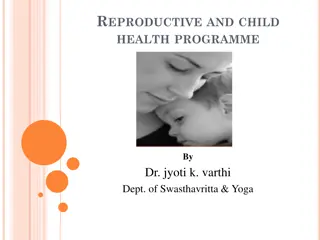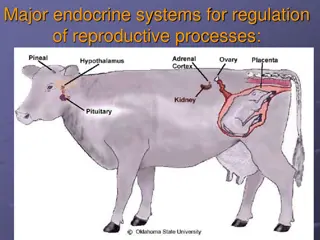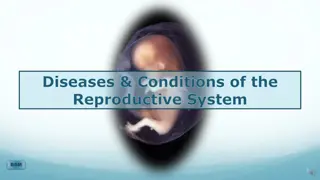Understanding Reproductive Health and Sexuality Education in 8th Grade
Exploring the biological anatomy of both males and females, this educational content delves into the reproductive system, menstruation cycles, pregnancy, abstinence, and early pregnancy symptoms. It covers crucial topics such as sexual health, responsibility, and the importance of reproductive education for 8th-grade students.
Download Presentation

Please find below an Image/Link to download the presentation.
The content on the website is provided AS IS for your information and personal use only. It may not be sold, licensed, or shared on other websites without obtaining consent from the author. Download presentation by click this link. If you encounter any issues during the download, it is possible that the publisher has removed the file from their server.
E N D
Presentation Transcript
Reproductive System and Health SEXUALITY, HEALTH AND RESPONSIBILITY EDUCATION- 8THGRADE
Biological Male Anatomy Rolls Film Clipart Clip art of Film Clipart #5762 Clipartwork
bladder seminal vesicle vas deferens prostate gland urethra Cowper's gland penis testicle epididymis scrotum
Biological Female Anatomy Englishcanbefun's Weblog | Cinema: types of films
Fallopian tube ovary Uterus cervix vagina
Stage 1 (1-7 days) Lining flows out of the uterus through the vagina. This is menstruation, or the period. Stage 4 (about 14 days) Egg travels to uterus. If it s not fertilized, it leaves the body with the next period. Stage 2 (6-12 days) Egg matures in the ovary and uterus lining gets thicker. Stage 3 (about 14 days before next period) Egg is released from ovary and moves into fallopian tube.
Pregnancy and Reproduction Explained Icones Play, images Play png et ico (page 9)
WCSD Definition of Abstinence WCSD Definition of Abstinence Sexual abstinence is defined as refraining from all forms of sexual activity and genital contact such as vaginal, oral and anal sex. An abstinent person is someone who has either never had sex or someone who's had sex but who has decided not to continue having sex for a period of time. Abstinence is the only 100% effective way to prevent HIV, other sexually transmitted diseases or infections and pregnancy. SEX when a person s genitals touch another person s genitals, mouth or anus.
Early Pregnancy Symptoms Early Pregnancy Symptoms Missed period Swollen or tender breasts Nausea and/or vomiting Feeling tired Bloating Constipation Peeing more often than usual
How Can I Reduce my Sexual Health Risk? Movie Clapper Board by gnokii
Talk to a trusted adult Talk to a trusted adult Even if you re worried that talking to your parents about your body and sexual health will be awkward, it s a good idea to ask for their help (as long as you feel safe). Your parents were your age once, and they know what it s like to be a teenager. They might even be proud of you for being responsible about your health
Going to see a medical Going to see a medical health care provider health care provider Going to the doctor is an important part of making sure you stay healthy. Doctors can also answer any questions you have about puberty, your body, and sex.
Things to talk about with your doctor Things to talk about with your doctor have had vaginal sex, oral sex, or anal sex have had unprotected sex (sex without a condom or dental dam) think you might have an STD feel any pain, itching, or discomfort in your genitals (penis, testicles, vagina, vulva, or anus) have really bad cramps, PMS, or other problems with your periods notice any lumps in your testicles Feel a lump in your breast or vulva think you might be pregnant don t feel safe in a relationship or at home
Things to remember Things to remember oDoctors and nurses ask lots of questions so they can figure out if it s good idea to give you certain tests, help you use birth control, or talk with you about your relationships. oThere s no need to be embarrassed about answering those questions there are no wrong answers!
Keep in mind: Keep in mind: Your body? You re the boss.If you don t want a particular exam or test, or you want them to stop something they ve already started, it s OK to say stop. Ask why. You re allowed to ask your doctor or nurse why they want to do whatever exam, test, or procedure they say you need. You have a right to know, and to feel safe about what they re doing. This idea is called informed consent. Plus, health care professionals are usually happy to educate you about your body. You can change doctors.Didn t feel safe with the doctor or nurse you visited? Find out if there s someone else in your area you can go to for your health care. It s good to find someone you can trust and it s OK if it takes a few tries. If anything happens during your appointment that doesn t feel right or makes you feel unsafe, let and adult you trust know about it.
Local Resources Washoe County Health District: Teen Health Mall/Clinic 775-328-2470 Northern Nevada HOPES 775-786-4673 Planned Parenthood of Northern Nevada 775-688-5555 Crisis Call Center: text listen to 839863 Suicide Prevention Lifeline 1-800-273-8255 LGBTQ+ Friendly Services: https://www.nnhopes.org/patients/services/lgbtq/









